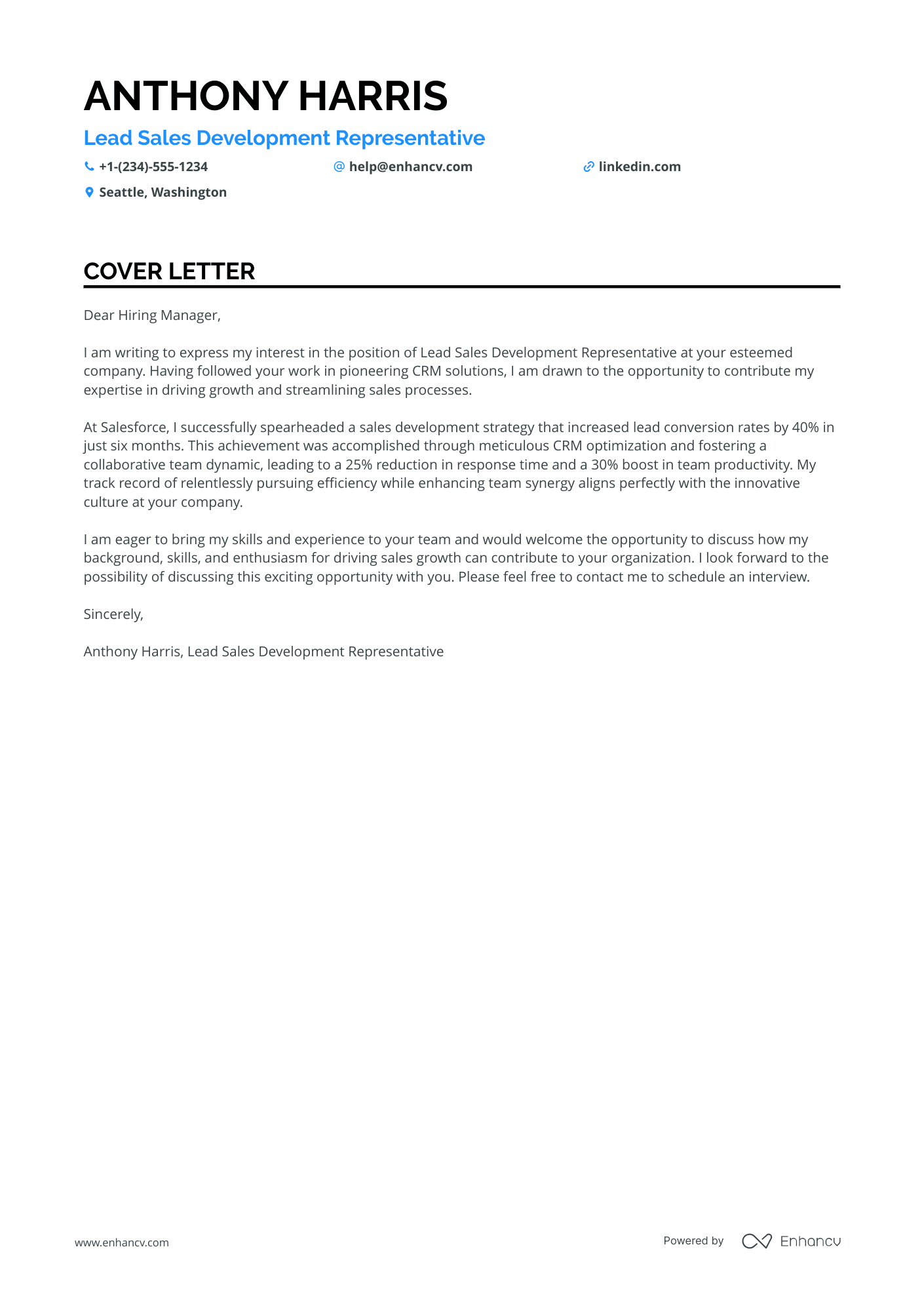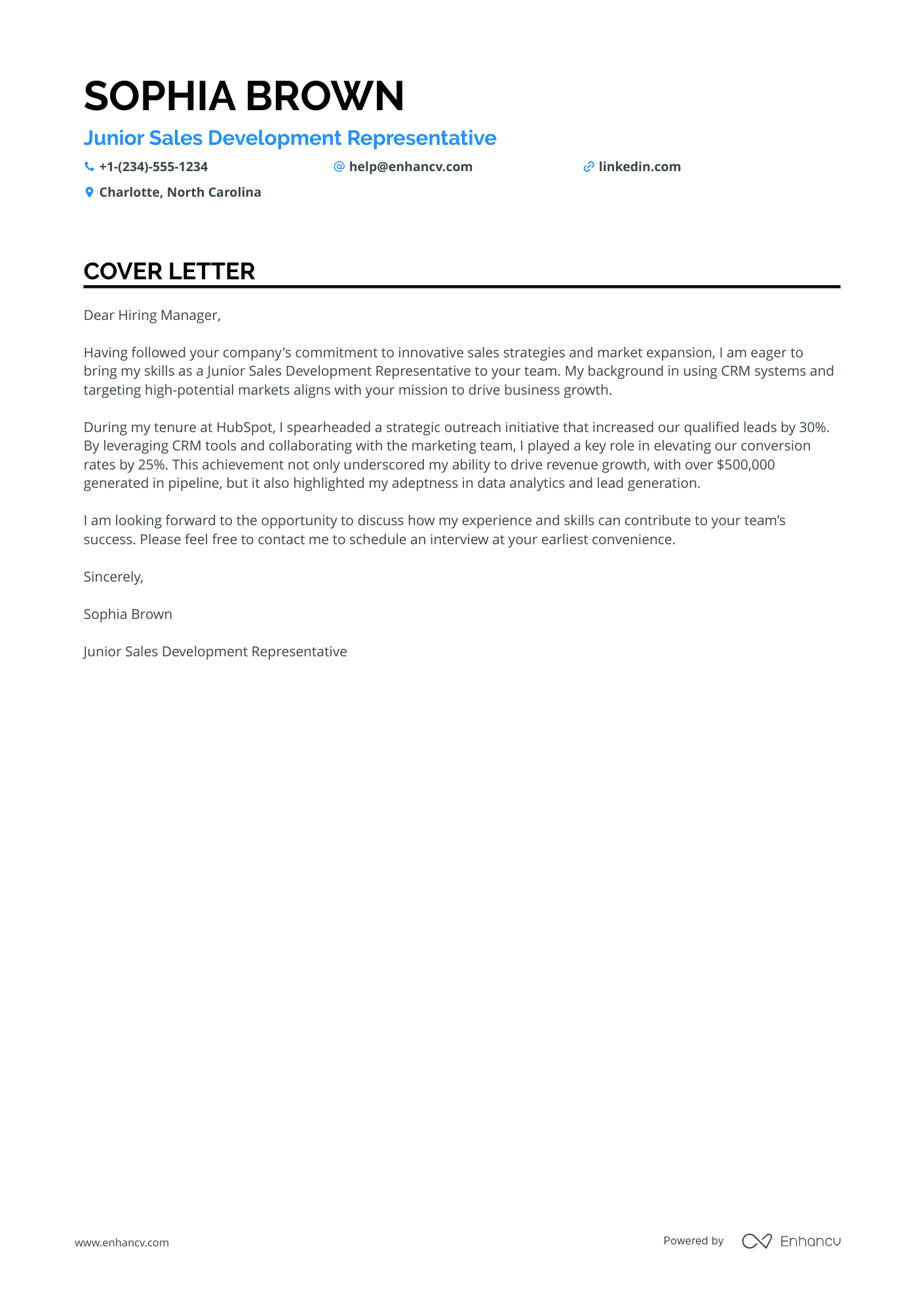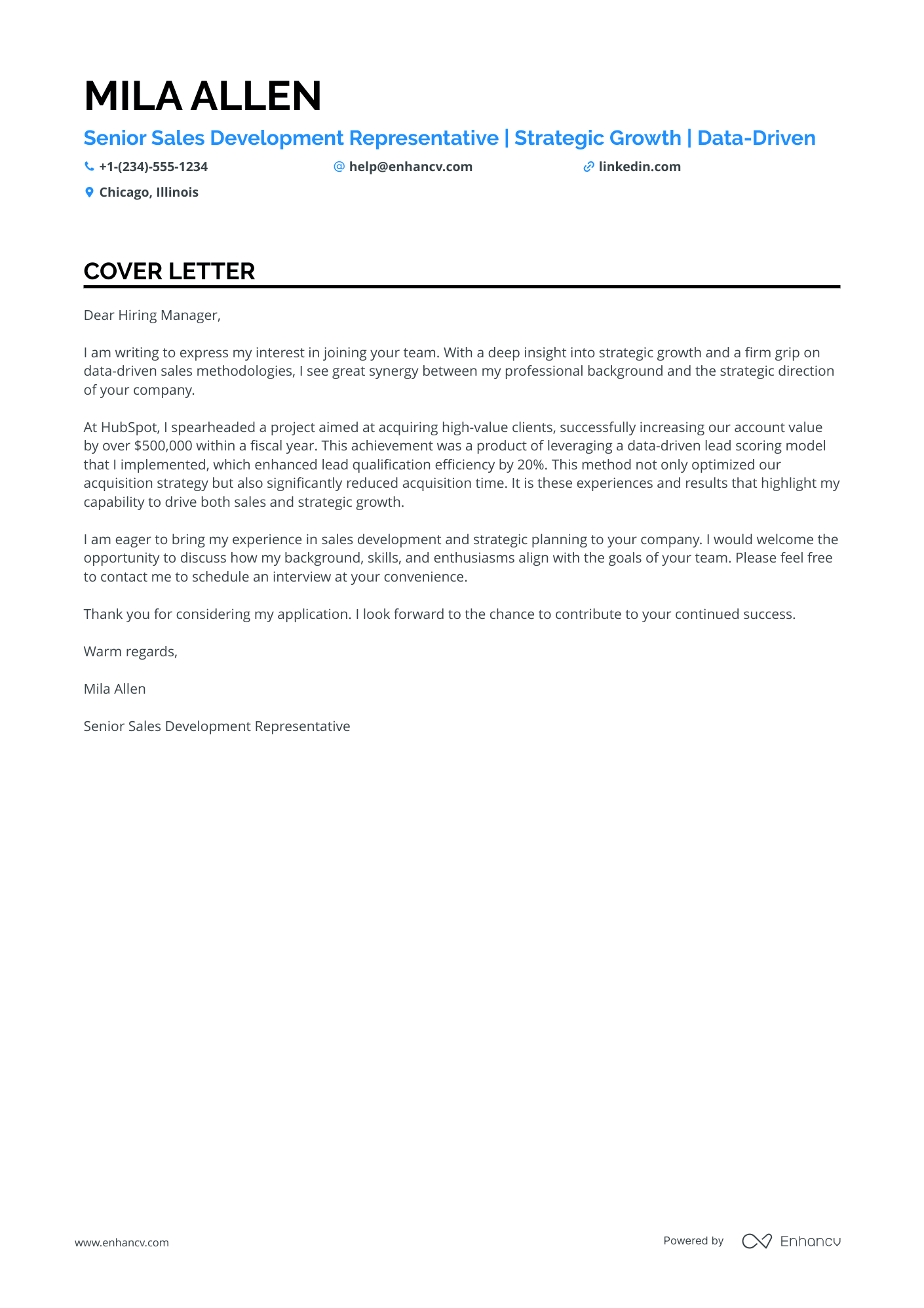Crafting a stellar sales development representative cover letter can be a daunting task as you dive into the job-hunting pool. You've refreshed your resume and started applying, only to realize a compelling cover letter is your next hurdle. It's not about echoing your resume; it's your chance to narrate your proudest professional triumph. Fusing formality with a fresh voice, dodge the clichés, and keep it concise—no more than a page. Let's mold your singular story into an irresistible introduction.
- Including all the must-have paragraphs in your structure for an excellent first impression;
- Learning how to write individual sections from industry-leading cover letter examples;
- Selecting the best accomplishment to tell an interesting and authority-building professional story;
- Introducing your profile with personality, while meeting industry standards.
And, if you want to save some time, drag and drop your sales development representative resume into Enhancv's AI, which will assess your profile and write your job-winning cover letter for you.
If the sales development representative isn't exactly the one you're looking for we have a plethora of cover letter examples for jobs like this one:
- Sales Development Representative resume guide and example
- Area Sales Manager cover letter example
- Advertising Sales Representative cover letter example
- Luxury Car Salesman cover letter example
- Fashion Retail cover letter example
- Sales Assistant cover letter example
- Sales Administrator cover letter example
- Executive Sales cover letter example
- Leasing Consultant cover letter example
- Tech Sales cover letter example
- Regional Sales Manager cover letter example
Drop your resume here or choose a file.
PDF & DOCX only. Max 2MB file size.
Sales development representative cover letter example
Madison Taylor
San Francisco, California
+1-(234)-555-1234
help@enhancv.com
- Quantifiable Achievements: The cover letter highlights specific accomplishments, such as the "120% increase in lead generation" and the "substantial opportunity pipeline valued at over $2M," which helps the employer understand the tangible value the candidate can bring to the role.
- Relevant Skills: Mention of "utilizing CRM tools like Salesforce" showcases the candidate's familiarity with essential industry software, which is crucial for a Sales Development Representative position.
- Event Management: Reference to launching a successful "webinar series" demonstrates the candidate's experience in organizing and managing events that are pertinent to business development and marketing efforts in a tech environment.
What are the basics of the design or format of your sales development representative cover letter?
To start, here's a reminder for you: the Applicant Tracker System (or software that is used to assess candidate profiles), won't be reading your sales development representative cover letter.
Recruiters enjoy reading sales development representative cover letters with a standardized format that uses:
- the same font as the resume (e.g. modern ones like Raleway or Volkhov are prefered over the clichéd Times New Roman or Arial);
- single spacing to keep the content concise and organized (this is all ready for you in our cover letter templates);
- a one-inch margin to wrap around the text, like in our cover letter builder;
- PDF as a file format, as it allows your design (and visual element) to stay the same.
Finally, we can't go on without mentioning the key sections of your sales development representative cover letter.
In the top one-third, make sure to include a header (with your contact information, name, role, and date), a salutation, and an introduction.
Next, follows the heart and soul of your sales development representative cover letter or its body.
End your sales development representative cover letter with a closing paragraph and, if you wish, a signature.
Pressed for time? Use our free cover letter generator to turn your resume into a cover letter effortlessly.
The top sections on a sales development representative cover letter
- Header: This should include the applicant's contact information, date, and the employer's details to ensure that the cover letter appears professional and goes to the right person, setting a formal tone for the rest of the document.
- Greeting: A personalized greeting that addresses the hiring manager by name demonstrates the candidate's attention to detail and interest in establishing a personal connection with the company.
- Introduction: The opening needs to immediately capture the recruiter's attention, possibly by mentioning a connection to the company or an enthusiasm for sales, to emphasize the candidate's suitability and interest in the role of a Sales Development Representative.
- Experience and Achievements: This section should highlight relevant experience, sales metrics, and any significant contributions to previous teams, demonstrating the ability to generate leads and contributing to sales pipelines which is crucial for a Sales Development Representative.
- Call to Action and Closing: The closing should express eagerness for a personal interview, reiterate the candidate's fit and enthusiasm for the role, and signal the intention to follow up, showing a proactive approach which is a valuable trait in sales.
Key qualities recruiters search for in a candidate’s cover letter
- Proven track record in sales or cold calling: Demonstrates the ability to engage with potential clients and generate interest.
- Strong communication and interpersonal skills: Necessary for building rapport and effectively conveying product value to prospects.
- Resilience and determination: Sales development is faced with frequent rejection; recruiters look for candidates who can persist and stay motivated.
- In-depth product and industry knowledge: Helps in addressing prospects' questions and positioning the product to meet their needs.
- Experience with sales tools and CRM software: Indicates that the candidate can efficiently manage leads and maintain records, which is essential for tracking progress.
- Ability to work collaboratively with sales and marketing teams: Ensures alignment in strategies and messaging, which is crucial for a smooth sales process.
How to personalize your sales development representative cover letter greeting
Before you start writing your sales development representative cover letter, take the time to find out who is recruiting for the role.
Search for the recruiter's name on LinkedIn or the corporate website to address them personally in your sales development representative cover letter salutation.
What if you can't find out who's recruiting for the role?
Always aim to avoid the very impersonal "Dear Sir/Madam" - instead, opt out for "Dear HR Team" or "Dear Hiring Manager" to make a better first impression.
List of salutations you can use
- Dear Hiring Manager,
- Dear [Company Name] Team,
- Dear [First Name Last Name],
- Dear [Job Title] Hiring Committee,
- Dear [Department Name] Department,
- Dear Ms./Mr./Dr. [Last Name],
The sales development representative cover letter introduction: focusing on your unique value, with a creative twist
You are not the only one wondering how to start your sales development representative cover letter. Those first two sentences introduce your profile and should be memorable.
No pressure.
When beginning your sales development representative cover letter, immediately point out the unique value of working with you. In other words, what you promise to bring to the role by using your past track record of success.
Start your sales development representative cover letter with a creative twist by telling a joke or stating something relatable. Select this type of introduction only if it aligns with the company culture.
Storytelling in the middle (or body) of your sales development representative cover letter
You've got your whole resume sorted, detailing your achievements and skills. What else can you write in your sales development representative cover letter?
For starters, take the time to re-assess the job requirements and re-discover the most crucial skills and requirements (or keywords).
After making a list of these important keywords, look back on your experience to select just one of your past accomplishments.
Choose the achievement that is the most noteworthy, relevant to the role, and matches the required skills.
Use the next between three and six paragraphs to narrate how:
- you've grown your skill set, thanks to your achievement;
- you'd use the know-how you've gained in your new role;
- your accomplishment could help your potential employers grow.
Remember that recruiters don't need a retelling of your whole resume, but want to find out what makes you, you.
Closing paragraph basics: choose between a promise and a call to action
You've done all the hard work - congratulations! You've almost reached the end of your sales development representative cover letter.
But how do you ensure recruiters, who have read your application this far, remember you?
Most sales development representative professionals end their cover letter with a promise - hinting at their potential and what they plan on achieving if they're hired.
Another option would be to include a call for follow-up, where you remind recruiters that you're very interested in the opportunity (and look forward to hearing from them, soon).
Choose to close your sales development representative cover letter in the way that best fits your personality.
The zero experience sales development representative cover letter: shifting the focus to your unique value
Don't worry if you have no conventional professional experience. Within your whole experience, there's plenty more you can write about in your sales development representative cover letter.
Take, for example, your biggest achievement or award - dedicate your cover letter body to describe it and the job-relevant skills you've learned.
Your professional ambitions could also take center stage. Describe what you plan on achieving in the next five to ten years and the efforts you're making towards your dreams.
Key takeaways
Writing your sales development representative cover letter has never been easier, so remember to:
- Select a sales development representative cover letter template that automatically meets industry formatting (e.g. has one-inch margins, is single-spaced, is in PDF, etc.);
- Make your sales development representative cover letter personal by mentioning the recruiters' first or last name;
- Within the introduction, describe what you like best about the company in no more than two sentences;
- Use your sales development representative cover letter body to tell a story of your greatest achievement, backed up by job-relevant skills and technologies;
- If you have no professional experience, be honest about it in your sales development representative cover letter, but also write about your unique talents.
Sales Development Representative cover letter examples
By Experience
Lead Sales Development Representative
- Specific Achievements: Highlighting specific outcomes such as increasing lead conversion rates and boosting team productivity demonstrates proven impact and quantifiable success in a sales role.
- Relevant Experience: Mentioning experience at a notable company like Salesforce adds credibility and relevancy, showcasing familiarity with industry-leading practices and competitive environments.
- Alignment with Company Culture: Expressing enthusiasm for the company's innovative culture and drawing parallels between past experiences and the desired workplace environment shows an understanding of the company's values and a fit for the role.
Junior Sales Development Representative
- Connection to Company Goals: The writer explicitly connects their skills and experiences to the company's goals, demonstrating a clear understanding of the company's mission and how they can contribute to it.
- Quantifiable Achievements: The inclusion of specific statistics, such as a 30% increase in qualified leads and a 25% rise in conversion rates, provides tangible evidence of past successes and effectively highlights the writer's impact in previous roles.
- Relevant Skills and Tools: Highlighting proficiency in CRM systems and data analytics resonates with essential qualifications for a Junior Sales Development Representative, making the applicant's skill set particularly relevant for the role.
- Proactive Initiative: The letter showcases the writer's initiative in leading a strategic outreach, emphasizing their ability to not only perform day-to-day tasks but also drive significant business development projects.
Senior Sales Development Representative
- Highlighting Achievements: Mentioning specific measurable outcomes, like increasing account value by over $500,000, demonstrates the ability to drive results and adds credibility.
- Incorporating Methodologies: Describing the use of data-driven sales methodologies provides insight into the applicant's strategic approach and analytical thinking, which are critical for a Sales Development role.
- Aligning Experience with Role: Explaining how past roles and responsibilities align with the potential contributions to the company's goals shows preparedness and understanding of the company's needs.
- Professional Tone and Enthusiasm: The cover letter maintains a professional yet enthusiastic tone, conveying the applicant's genuine interest in the role, which is crucial in sales positions.
By Role
Sales Development Representative Intern
- Results-Oriented Achievements: Emphasizing specific, quantifiable outcomes, such as increasing revenue by $500,000 and improving sales closure rates by 25%, demonstrates a strong track record of success and ability to drive impactful results in the sales domain.
- Alignment with Company Goals: Expressing a keen interest in the company's innovative culture and goals highlights a genuine enthusiasm for working with the organization and assures the employer of the applicant’s dedication to contributing positively.
- Relevant Experience Highlight: Mentioning past experience with a well-regarded company like Tech Mahindra and detailing specific projects adds credibility and positions the applicant as an experienced professional in the industry.
- Customized and Concise Communication: The letter is tailored to the specific role and company, focusing on key competencies and experiences relevant to the sales specialist position, ensuring clarity and engagement.












